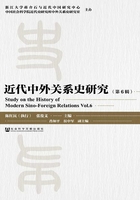
Intellectual Preparedness: Dr. Hu Shi, Lake Forest College, and Chinese Diplomacy during WWⅡ
Abstract: The year 1941 was a troubled period in American history during which intellectuals were ideologically caught in a very polarized world to rethink and redirect their rational inspirations in the face of world-wide fascism and communism. As WW II intensified and threatened the security of the U. S. , American intellectuals were divided into two opposing political camps each sympathetic with the isolationism and interventionism. It was at such a critical juncture that Dr. Hu Shih, Chinese Ambassador to the U. S. , came to Lake Forest College to deliver a speech at the College's 63rd Annual Commencement. The speech was a missing document in the Collected Works of Dr. Hu Shih. Tied in with this document was a drama imbued with multiple layers of historical accounts, contextualized by a series of political discourses ranging from the rise of isolationism in the U. S. to China's employment of soft-power diplomacy in the international arena, in which Dr. Hu played a significant role. This article attempts to explore China's wartime soft-power diplomacy and its impact on American intellectuals prior to the Pearl Harbor.
Key words: Hu Shih; Lake Forest College; Chinese Diplomacy;World War Ⅱ
At the 2012 American Historical Association(AHA)Annual Conference, President William Cronon offered his presidential address as a meditation on the writing and teaching of history in the face of contemporary challenges. As a historian, he worried about the growing tendency of professional“boredom. ”Namely, when historians talk mainly with each other, they adopt vocabularies and ways of speaking that have the effect of excluding outsiders who do not belong to the profession. Moreover, when we teach students, we often introduce them to how to frame research questions, locate documents, perform analysis, interpret historiographies, and construct arguments, but forget to ask how all these pieces might fit together to create“a good story”. President Cronon's prescription to the symptom is simple—“tell good stories! ”
This article is a story-based object that attempts to explore a large issue of China's wartime diplomacy through a small case, a missing speech delivered by Dr. Hu Shih, Chinese Ambassador to the U. S. , in the 63rdAnnual Commencement of Lake Forest College in 1941. In particular, I want to use this case to interpret China's efforts of reshaping its international relations with the U. S. against Japan at a critical historical juncture prior to Pearl Harbor. Tied in this event was a drama imbued with multiple layers of historical accounts, contextualized by a series of political discourses ranging from the rise of isolationism in the U. S. to China's employment of soft-power diplomacy in the international arena. My aim in scrutinizing and juxtaposing these accounts is to not only uncover a missing chapter in the Lake Forest College's history, but also look beyond the history to address a more significant issue of how to conceptualize historical narratives from a theoretical perspective.